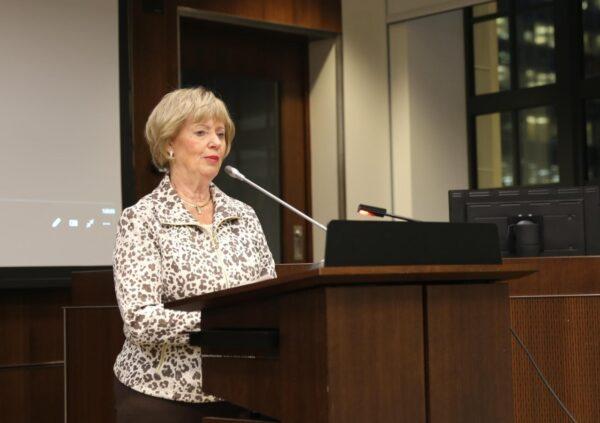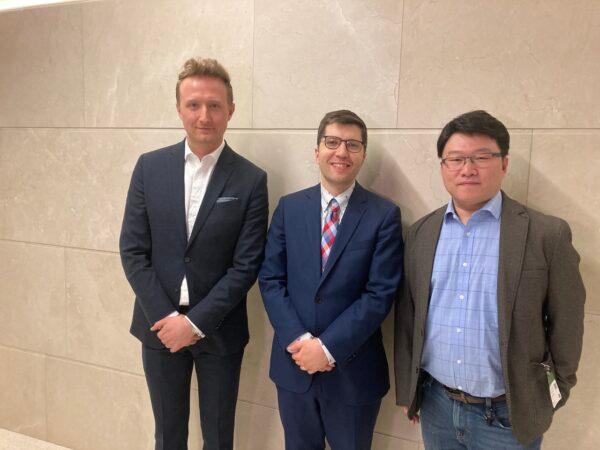On Parliament Hill on Feb. 13, MPs hosted a special screening of “Eternal Spring,” an award-winning film depicting Beijing’s persecution of religious rights. The animated documentary is Canada’s selection in the category of Best International Feature Film at the 95th Academy Awards next month.
Directed by Torontonian Jason Loftus and animated by acclaimed Chinese artist Daxiong, “Eternal Spring” pieces together events that occurred in China nearly 20 years ago. It tells the story of 18 Chinese citizens who managed to tap into state cable television and broadcast uncensored news about the Beijing regime’s persecution campaign against Falun Gong adherents.
Liberal MP Judy Sgro and Conservative MP Garnett Genuis hosted the Feb. 13 screening, ahead of the 21st anniversary of the TV station hijacking effort that took place on March 5, 2002, in Changchun, the capital of Jilin Province. In English, Changchun means “eternal spring.”
“Eternal Spring” is the first-ever Mandarin-language film to represent Canada in the Oscars’ best international feature film category and the only film in 2023 to qualify in both the Best Animated Feature and Best Documentary Feature categories.

“I’ve never seen anything like it. To use animation to tell a story about people’s struggles ... it was fascinating,” Sgro told The Epoch Times at the screening.
“The stages that [the film] goes in are easy to absorb, easy to understand, and it’s easy to see the suffering and people’s desire to be able to be free to practice what they want.”
“No wonder ‘Eternal Spring’ is going to win all of these awards, because that’s very remarkable, absolutely remarkable,” she added.
Genuis said the film is an inspiration to those who continue the fight for freedom.
“It really brings to light the struggle for freedom and justice,” he told The Epoch Times at the event. “It’s really a pleasure to be able to bring beautiful art that also has an important and powerful message [to Parliament].”

“It’s a very powerful and moving presentation of that history [of the Falun Gong persecution]. And it should be inspiring for us today to do what we can to continue the work of trying to bring truth and information to people and help people to access information about what’s really going on in China and around the world,” he added.
Conservative MP Cathay Wagantall, who also attended the screening, said it’s of “very deep concern” for her to hear about so many incidents of Beijing’s religious persecution of Falun Gong, as well as campaigns targeting people of other faiths in China.
Persecution
Falun Gong, also known as Falun Dafa, consists of meditative exercises and moral teachings based on the tenets of truthfulness, compassion, and forbearance. After it was introduced in China in 1992, it quickly gained widespread popularity due to its reported benefits to people’s physical and mental health. By 1999, the practice had attracted 70 million to 100 million adherents, according to official Chinese estimates.However, then-Chinese Communist Party (CCP) leader Jiang Zemin perceived that popularity as a threat to the regime’s totalitarian rule, and launched a violent suppression of Falun Gong adherents on July 20, 1999, in an attempt to eradicate the practice.

Despite various obvious discrepancies in the video, and despite its validity being challenged by international researchers and media outlets, Xinhua’s reporting of the so-called self-immolation was used by the CCP to demonize Falun Gong. It struck a major propaganda victory for the CCP, prompting many Chinese citizens to proactively turn in their coworkers, neighbours, and even family members who practiced Falun Gong, believing the practice was truly dangerous.
The highly complicated and risky endeavour was successful, but the authorities immediately launched a massive sweep and arrested more than 5,000 Falun Gong practitioners. At least seven were beaten to death within days.
Daxiong, who was forced to flee his hometown because of the police raids, recalls the event in “Eternal Spring” resulting from his interviews with the sole survivor who participated in the daring television station hijacking.
“This film is not necessarily just about Falun Gong, but about the truth,” he said at the screening.
“The Chinese regime relies on lies and violence in its reign over the Chinese people, and [the film] talks about how to uncover those lies and bring the truth to the people.”





